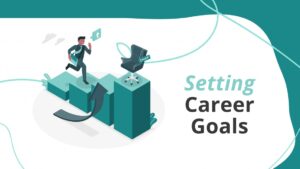Graduating from college is an exciting milestone, but it also marks the beginning of a new journey in the professional world. Navigating this transition can be challenging, especially in today’s dynamic job market. Effective career planning is crucial for setting yourself up for success and achieving your professional goals. Here are essential career planning tips for college graduates in 2024.
Figure 1: Setting clear career goals to guide your professional journey.
1. Set Clear Career Goals

Having clear career goals is the first step toward achieving professional success. Define what you want to achieve in both the short and long term to give your career direction and focus.
Tips:
- Identify Your Interests: Determine what fields or roles excite you the most.
- Set SMART Goals: Make your goals Specific, Measurable, Achievable, Relevant, and Time-bound.
- Regularly Review Goals: Periodically reassess your goals to ensure they align with your evolving interests and circumstances.
Figure 2: Crafting a strong resume that highlights your skills and experiences.
2. Build a Strong Resume
Your resume is often the first impression potential employers have of you. Make sure it effectively showcases your skills, experiences, and accomplishments.
Tips:
- Highlight Achievements: Focus on quantifiable achievements rather than just job duties.
- Tailor for Each Job: Customize your resume to match the specific requirements of each job application.
- Keep It Updated: Regularly update your resume with new experiences and skills.
Figure 3: Gaining experience through internships and volunteering opportunities.
3. Leverage Internships and Volunteering
Internships and volunteering provide valuable experience and can help you build a professional network. They also demonstrate your commitment and willingness to learn.
Tips:
- Seek Relevant Opportunities: Look for internships and volunteering roles related to your career interests.
- Network: Use these opportunities to connect with professionals in your field.
- Learn Actively: Treat every task as a learning opportunity and ask for feedback.
Figure 4: Developing soft skills like communication and teamwork.
4. Develop Soft Skills
While technical skills are important, soft skills like communication, teamwork, and problem-solving are equally crucial. These skills enhance your ability to work effectively with others and adapt to different situations.
Tips:
- Communication: Practice active listening and clear, concise communication.
- Teamwork: Participate in team projects and collaborate with colleagues.
- Problem-Solving: Take on challenging tasks that require creative solutions.
Figure 5: Networking with professionals in your industry.
5. Network Effectively

Building a professional network is essential for career growth. Networking can open doors to new opportunities, provide valuable insights, and help you stay informed about industry trends.
Tips:
- Attend Events: Participate in industry conferences, workshops, and networking events.
- Use Social Media: Leverage platforms like LinkedIn to connect with professionals in your field.
- Maintain Relationships: Regularly check in with your contacts to keep relationships strong.
Figure 6: Seeking guidance from a mentor in your field.
6. Seek Mentorship
A mentor can provide guidance, support, and valuable career advice. Find a mentor who has experience in your field and can help you navigate your career path.
Tips:
- Identify Potential Mentors: Look for experienced professionals in your network.
- Build Relationships: Establish a rapport before asking for mentorship.
- Be Receptive: Be open to feedback and willing to learn from your mentor’s experiences.
Figure 7: Engaging in continuous learning to stay updated in your field.
7. Engage in Continuous Learning
The job market is constantly evolving, and staying relevant requires continuous learning. Invest in your education and skills development to stay competitive.
Tips:
- Online Courses: Take advantage of online learning platforms.
- Certifications: Obtain certifications relevant to your industry.
- Workshops and Seminars: Attend workshops and seminars to expand your knowledge and network.
Figure 8: Staying informed about the latest industry trends and developments.
8. Stay Updated with Industry Trends
Keeping up with industry trends helps you anticipate changes and stay ahead of the competition. Regularly read industry news, attend relevant events, and follow thought leaders.
Tips:
- Industry Publications: Subscribe to industry magazines and journals.
- Webinars and Conferences: Attend webinars and conferences related to your field.
- Social Media: Follow industry experts and organizations on social media.
Figure 9: Maintaining a healthy work-life balance for overall well-being.
9. Maintain a Healthy Work-Life Balance
Achieving a healthy work-life balance is crucial for long-term career success and personal well-being. Ensure you allocate time for rest, hobbies, and relationships outside of work.
Tips:
- Set Boundaries: Establish clear boundaries between work and personal time.
- Prioritize Self-Care: Engage in activities that promote your physical and mental health.
- Time Management: Use effective time management techniques to balance your responsibilities.
Figure 10: Being open to change and new opportunities in your career.
10. Be Open to Change

The ability to adapt to change is a valuable trait in today’s dynamic job market. Be open to new opportunities and willing to pivot when necessary.
Tips:
- Flexibility: Stay flexible and open-minded about new roles and responsibilities.
- Resilience: Develop resilience to handle setbacks and challenges.
- Proactive Learning: Continuously seek opportunities to learn and grow.
Conclusion
Effective career planning is an ongoing process that requires dedication, flexibility, and continuous learning. By setting clear goals, staying informed, and developing both hard and soft skills, you can navigate the complexities of the modern job market and achieve your professional aspirations. Use these essential career planning tips for college graduates in 2024 to guide your journey toward a successful and fulfilling career


